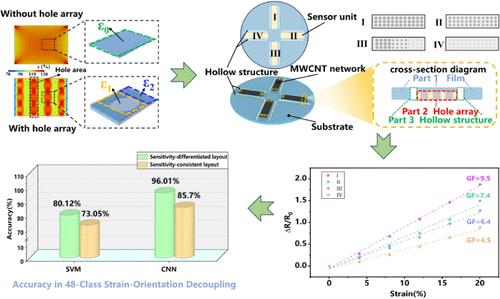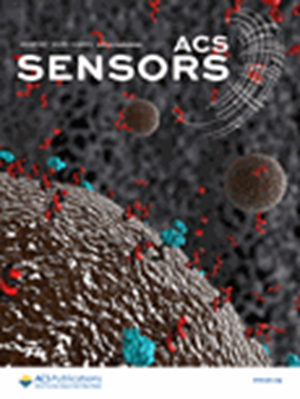Directional Characteristic Enhancement of an Omnidirectional Detection Sensor Enabled by Strain Partitioning Effects in a Periodic Composite Hole Substrate
IF 8.2
1区 化学
Q1 CHEMISTRY, ANALYTICAL
引用次数: 0
Abstract
An omnidirectional stretchable strain sensor with high resolution is a critical component for motion detection and human–machine interaction. It is the current dominant solution to integrate several consistent units into the omnidirectional sensor based on a certain geometric structure. However, the excessive similarity in orientation characteristics among sensing units restricts orientation recognition due to their closely matched strain sensitivity. In this study, based on strain partition modulation (SPM), a sensitivity anisotropic amplification strategy is proposed for resistive strain sensors. The stress distribution of a sensitive conductive network is modulated by structural parameters of the customized periodic hole array introduced underneath the elastomer substrate. Meanwhile, the strain isolation structures are designed on both sides of the sensing unit for stress interference immune. The optimized sensors exhibit excellent sensitivity (19 for 0–80%; 109 for 80%–140%; 368 for 140%–200%), with nearly a 7-fold improvement in the 140%–200% interval compared to bare elastomer sensors. More importantly, a sensing array composed of multiple units with different hole configurations can highlight orientation characteristics with amplitude difference between channels reaching up to 29 times. For the 48-class strain-orientation decoupling task, the recognition rate of the sensitivity-differentiated layout sensor with the lightweight deep learning network is as high as 96.01%, superior to that of 85.7% for the sensitivity-consistent layout. Furthermore, the application of the sensor to the fitness field demonstrates an accurate recognition of the wrist flexion direction (98.4%) and spinal bending angle (83.4%). Looking forward, this methodology provides unique prospects for broader applications such as tactile sensors, soft robotics, and health monitoring technologies.

利用周期性复合孔基底中的应变分区效应增强全向探测传感器的方向特性
具有高分辨率的全向拉伸应变传感器是运动检测和人机交互的关键部件。目前的主流解决方案是根据一定的几何结构将多个一致的单元集成到全向传感器中。然而,由于各传感单元的应变灵敏度非常接近,其方向特征的过度相似性限制了方向识别。本研究基于应变分区调制(SPM),为电阻应变传感器提出了一种灵敏度各向异性放大策略。敏感导电网络的应力分布由弹性体基底下引入的定制周期孔阵列的结构参数调制。同时,在传感单元两侧设计了应变隔离结构,以实现应力干扰免疫。优化后的传感器具有出色的灵敏度(0-80% 为 19;80%-140% 为 109;140%-200% 为 368),与裸弹性体传感器相比,140%-200% 区间的灵敏度提高了近 7 倍。更重要的是,由具有不同孔结构的多个单元组成的传感阵列可以突出方位特征,通道之间的振幅差可达 29 倍。在 48 级应变取向解耦任务中,采用轻量级深度学习网络的灵敏度差异化布局传感器的识别率高达 96.01%,优于灵敏度一致性布局的 85.7%。此外,该传感器在健身领域的应用表明,它能准确识别手腕弯曲方向(98.4%)和脊柱弯曲角度(83.4%)。展望未来,该方法为触觉传感器、软机器人和健康监测技术等更广泛的应用提供了独特的前景。
本文章由计算机程序翻译,如有差异,请以英文原文为准。
求助全文
约1分钟内获得全文
求助全文
来源期刊

ACS Sensors
Chemical Engineering-Bioengineering
CiteScore
14.50
自引率
3.40%
发文量
372
期刊介绍:
ACS Sensors is a peer-reviewed research journal that focuses on the dissemination of new and original knowledge in the field of sensor science, particularly those that selectively sense chemical or biological species or processes. The journal covers a broad range of topics, including but not limited to biosensors, chemical sensors, gas sensors, intracellular sensors, single molecule sensors, cell chips, and microfluidic devices. It aims to publish articles that address conceptual advances in sensing technology applicable to various types of analytes or application papers that report on the use of existing sensing concepts in new ways or for new analytes.
 求助内容:
求助内容: 应助结果提醒方式:
应助结果提醒方式:


